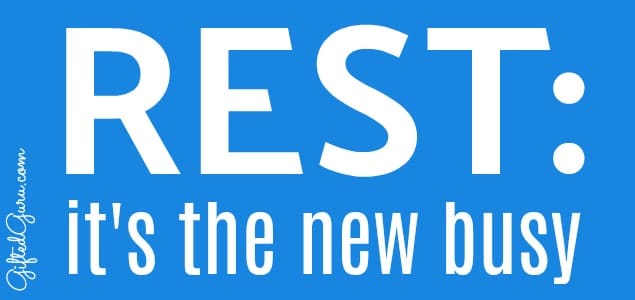Rest is not idleness,
and to lie sometimes on the grass on a summer day
listening to the murmur of water, or watching the clouds float across the sky,
is hardly a waste of time.
~John Lubbock
Rest. Its importance cannot be overstated. I’m going to give it a shot.
We’re too busy.
We’re too busy. All of us. Kids included. Gifted kids especially included. And we’re too tired. Our whole country is conducting an unsupervised sleep deprivation experiment with an unhealthy dose of overscheduling thrown in.
We don’t think God was lazy for resting on the 7th day, but if our schedules are any indication, we don’t think it’s a good idea for us.
We give lip service to rest.
Airlines mandate it for flight crews. We recognize that athletes need to rest their muscles between workouts and their bodies between games, although many of them take supplements to try to supercede the body’s need for muscle rest.
In Japan, they have a word karoshi that means “death from overwork.” While our children are unlikely to die from overscheduling and lack of sleep, other dangers lurk.
The Importance of Sleep
A study done in 2007 showed that lack of sleep led to obesity in pre-teens. A British study found that young adults who don’t sleep enough aren’t as healthy as their well-rested peers.
Another study found that children who don’t get enough sleep get hurt more often. Yet Another study found that only 15% of teens reported getting 8 1/2 hours of sleep on school nights (that’s how much they need – at least!). Being tired makes us clumsy physically, it appears, and I think it also makes us clumsy mentally in a lot of ways.
I wrote an article about sleep myself that was published in Mensa’s magazine.
Its Effect on Learning
It’s not good that many of our kids are getting their rest in the car on the way to yet another place to go.
Sleep is crucial to all three stages of learning and memory – acquisition, consolidation, and recall. If we’re tired, we’re just not as smart. We’re not on our game.
It’s more than just sleep, though. It’s being so rushed, so tired, that we can’t fully experience our lives or explore our minds.
Gifted minds need breaks from artificial stimuli so that their minds can process and create.
Douglas Pagels reminds us that “Some of the secret joys of living are not found by rushing from point A to point B, but by inventing some imaginary letters along the way.”
Imagination. Creativity. Play. Rest. These things are interconnected and more powerful than we sometimes realize.
We also may fail to realize that it’s perfectly fine to do perfectly nothing.
As those famous philosophers, Calvin and Hobbes, said: There’s never enough time to do all the nothing you want.
Overscheduled Kids
Time Magazine published an article challenging what they call the “myth” of the over-scheduled child. Time (who recently got on my nerves and created huge problems in my household by insisting all parents have favorites) used research conducted by Joseph Mahoney at Yale that showed that kids’ well-being “tends to improve when they participate in extracurriculars.”
But how many? The study showed that only 6% of teens spend more than 20 hours a week in organized activities, but add that to the hours in school, and you’ve got a lot of kids with part-time jobs being essentially professional kids.
I wasn’t impressed that the study showed that heavily-scheduled kids eat meals with their parents more often than kids who aren’t scheduled in anything. Of course they do. It’s just that the meals are in the car.
I’m not saying you should pull your kids out of Little League. I’m just saying that twice-a-week practices for a four-year-old is really more about the parents than the kids, and that rest from the hamster wheel that has become modern life is crucial to letting gifted minds develop.
Rest. It’s the new busy.
The National Institutes of Health have created a free curriculum for teaching about the science of sleep. It’s available here.
HealthAmbition has a great article on sleep and its importance here.





